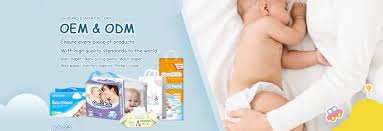The global baby diaper industry has undergone significant Baby Diaper Manufacturer over the years, evolving from basic cloth nappies to highly advanced disposable and reusable diapers. Baby diaper manufacturers today are not only focused on comfort and convenience but also on sustainability, safety, and innovation. This article explores how modern diaper manufacturers are shaping the future of baby care through advanced technology, eco-friendly practices, and consumer-driven solutions.
The Evolution of Baby Diaper Manufacturing
The journey of baby diapers began with traditional cloth nappies, which required frequent washing and maintenance. Over time, the demand for more convenient options led to the invention of disposable diapers. Today’s baby diaper manufacturers integrate cutting-edge materials and engineering to ensure superior absorbency, skin protection, and eco-conscious production.
Key Developments in Diaper Technology:
- Super Absorbent Polymers (SAP): These materials can lock in moisture, keeping the baby dry for extended periods.
- Breathable Fabrics: Modern diapers use breathable yet leak-proof layers to prevent rashes and irritation.
- Wetness Indicators: Many diapers now feature color-changing strips that inform caregivers when a change is needed.
- Elastic Waistbands and Stretchable Sides: These provide a snug yet comfortable fit, reducing leaks and enhancing mobility.
Eco-Friendly Innovations in Baby Diaper Manufacturing
With growing environmental concerns, baby diaper manufacturers are increasingly adopting sustainable practices. Traditional disposable diapers take hundreds of years to decompose, leading to significant landfill waste. As a response, manufacturers are developing biodegradable, reusable, and plant-based diaper alternatives.
Sustainable Trends in Diaper Production:
- Biodegradable Materials: Some manufacturers use bamboo fibers, cornstarch-based films, and other compostable materials to reduce waste.
- Chlorine-Free Processing: Avoiding chlorine bleaching minimizes environmental pollution and reduces the risk of skin irritation.
- Reusable Cloth Diapers with Modern Features: These come with absorbent inserts and waterproof covers, offering an eco-friendly alternative to disposables.
- Water-Saving Manufacturing Techniques: Companies are now adopting water-efficient production processes to minimize resource consumption.
Safety and Skin-Friendly Features
Baby skin is highly sensitive, making diaper safety a top priority for manufacturers. To prevent irritation and allergic reactions, leading brands are developing hypoallergenic diapers free from harsh chemicals, fragrances, and synthetic dyes.
How Manufacturers Ensure Safety:
- Dermatologist-Approved Materials: Many diaper brands collaborate with skin experts to create rash-free products.
- No Harmful Chemicals: Paraben-free, latex-free, and fragrance-free diapers are becoming the industry standard.
- pH-Balanced Linings: Special inner layers help maintain the baby’s skin moisture balance, reducing the risk of diaper rashes.
- Organic and Natural Options: Some manufacturers use plant-based fibers and organic cotton for a softer, gentler diaper.
Market Trends and Consumer Preferences
The baby diaper industry is continuously evolving to meet the demands of modern parents. Convenience, sustainability, and affordability drive purchasing decisions, influencing how manufacturers design and market their products.
Current Trends in the Baby Diaper Market:
- Smart Diapers: Equipped with sensors, these diapers notify caregivers via mobile apps when a change is required.
- Subscription Services: Many brands now offer diaper delivery services, ensuring parents never run out of supplies.
- Personalized Fit and Design: Companies are introducing size-adjustable diapers to accommodate growing babies more efficiently.
- Cultural and Regional Customization: Manufacturers are tailoring diaper designs based on regional preferences, such as eco-conscious consumers in Europe or ultra-absorbent night diapers for markets with longer sleep cycles.
The Future of Baby Diaper Manufacturing
As technology advances and environmental concerns continue to shape consumer preferences, the diaper manufacturing industry will keep evolving. The future may bring innovations like 100% biodegradable diapers, AI-powered smart diapers that analyze urine composition for health insights, and even self-cleaning diaper solutions.
Baby diaper manufacturers play a crucial role in ensuring the health, comfort, and well-being of infants worldwide. By balancing innovation, safety, and sustainability, they continue to redefine modern parenting and baby care.
Conclusion
The baby diaper manufacturing industry has come a long way from traditional cloth nappies to high-tech, sustainable, and ultra-comfortable solutions. As parents demand safer, greener, and smarter options, manufacturers must stay ahead with innovative technologies and eco-friendly alternatives. The future of baby diapers is bright, ensuring that both babies and the planet remain happy and healthy.

